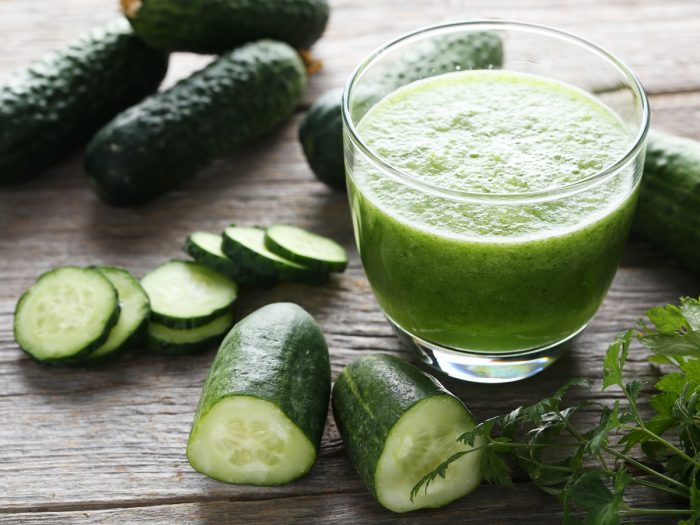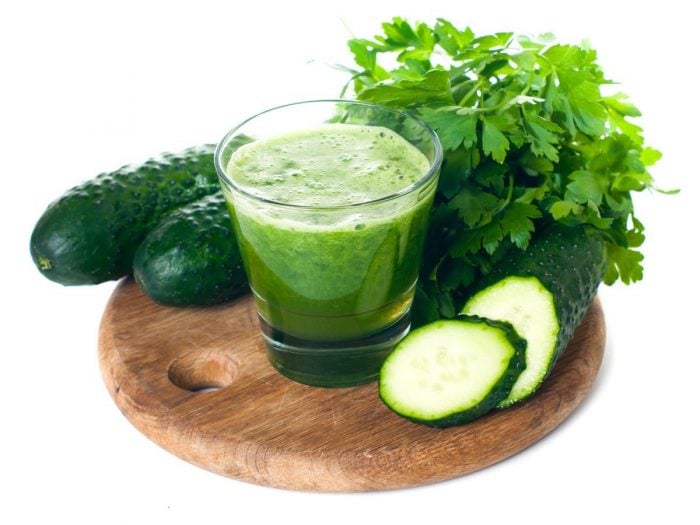Drinking cucumber juice is a relatively new trend, but like other fruit and vegetable juices, it is touted as a possibly highly concentrated source of nutrients that can deliver a number of health benefits. Cucumber juice is prepared from cucumbers (Cucumis sativus), which are long, dark green vegetables. This creeping vine plant is cultivated in many countries around the world, but it is primarily grown and distributed from China. Cucumbers are coated with a thick, waxy skin that helps to keep them fresh, making these vegetables highly-prized in culinary applications. However, juicing this simple vegetable is another great option to access a concentrated form of its many healthy nutrients.
According to the USDA National Nutrient Database, peeled cucumbers (and therefore its juice) are possibly rich in water, vitamin K, vitamin C, copper, magnesium, potassium, some B-family vitamins, vitamin A, dietary fiber, electrolytes, and other polyphenolic compounds that can impact the body. Unlike many other fruit juices, cucumber juice is much easier to make at home than to find in a store, since it isn’t particularly common. There are many different ways in which you can improve the flavor of cucumber juice or customize the recipes, making this a delicious and simple vegetable juice that can have a noticeable impact on your overall health. [1]
Benefits of Cucumber Juice
Some of the most important health effects of cucumber juice may include strengthening the kidneys, controlling bleeding disorders, increasing bone mineral density, boosting nervous system function, managing hormone production, improving the immune system, supporting vision health, optimizing the metabolism and keeping you hydrated, among others.
May Reduce Cholesterol
One double-blind, placebo-controlled study suggests that a 500mg daily dosage of the cucumber seed extract can result in desirable effects on serum lipid profile in adult hyperlipidemic patients. Therefore, processing cucumber seed into part of a healthy cucumber juice may, in fact, help lower “bad” LDL cholesterol while increasing “good” HDL cholesterol. However, more studies are needed to confirm these results in larger populations. [2]
May Boost Immunity
Notable levels of vitamin C in this juice can make it a great choice for boosting the immune system. It can stimulate the production of white blood cells, which are the body’s first line of defense. It also behaves as a potential antioxidant, seeking out and neutralizing harmful free radicals. [3]

Add some cubes of pineapple or apple in cucumber juice for a tropical twist. Photo Credit: Shutterstock
May Balance Hormone Levels
People associate calcium with bone health but the level of calcium in your blood is also a key determinant of your hormonal balance. If your thyroid gland or pituitary gland begins to malfunction, the possibly higher levels of calcium from this juice can help to compensate, keeping hormone levels normal. Ultimately, you will want to visit your physician for any ongoing hormonal issues. [4]
May Detoxify the Body
Cucumber juice has possibly high water content, making these vegetables great for maintaining hydration. In juice form, particularly if you add a bit more water to improve the consistency, you can ensure that your body is adequately hydrated all day! It also provides soothing effects and nourishment to the skin, according to a review in the journal Fitoterapia. [5]
May Help Blood Coagulation
If you suffer from bleeding issues, ranging from bloody noses or heavy menstruation to hemorrhoids and bleeding gums, you may be deficient in vitamin K. This vitamin, found in potentially high levels in cucumber juice, can help trigger coagulation in the body and speed the healing of damaged tissues. [6]
May Strengthen the Nervous System
Calcium functions as a potential electrolyte in certain situations and plays a key role in nervous system communication to the muscles. The possibly high level of this vitamin in this juice may help optimize your physical activities and your body will be firing on all cylinders.
May Protect Vision
Possibly moderate amounts of vitamin A, in addition to other antioxidants that may be found in this juice, can help to protect our vision health as we age. Macular degeneration is caused by oxidative stress in the center of the retina, causing strain in vision, but this juice can eliminate those free radicals before they can do serious damage. According to the International Research Journal of Pharmacy and Pharmacology, [7] regular low doses of cucumber can help in delaying cataractogenesis (cataract formation).
How to Make Cucumber Juice
The type of cucumber you choose may make a slight difference in the juice’s overall nutrient content; the three main types are seedless, pickling and slicing. For juicing purposes, you want the seedless or slicing variety. If you want to keep the dietary fiber benefits of cucumber juice, you will want to blend the cucumber, rather than juice and strain it. You may also want to add a bit of water, in this case, to prevent the consistency of the juice from being too thick.
The preparation below is for pure cucumber juice, with the pulp and fibrous material removed.

Refreshing Cucumber Juice Recipe
Ingredients
- 3 medium-sized cucumbers
- 1 cup of water (if necessary, to improve consistency)
- 1 tsp lime juice (for flavor, if desired)
Instructions
- To make cucumber juice, remove the skin of the cucumbers with a knife or a potato peeler.
- Slice and chop the cucumbers into a manageable size.
- Add the cucumbers to your blender or food processor.
- Blend for 1-2 minutes for an even consistency of the juice.
- Pour the blended cucumbers into a sieve or cheesecloth, allowing the juice to filter through into a jar.
- Press the cucumber fiber with a spoon, squeezing out as much juice as possible.
- Discard the cucumber fiber.
- Add water, if necessary, along with lemon or lime juice, to taste.
- Refrigerate the pure cucumber juice. Once it is cooled, enjoy the chilled refreshing drink with your friends and family!

Uses of Cucumber Juice
Cucumber juice can be a healthy and refreshing beverage on a hot summer day but it also has many other therapeutic or medicinal uses, especially for the hair and skin.
Hair rejuvenation: Due to the presence of vitamin C, copper, vitamin K, and various sulfuric compounds, cucumber juice has often been used in the hair to promote healthy growth and an irritation-free scalp. The cooling and antioxidant properties of this juice may help relieve some inflammation and deliver nutrients directly to the site of the hair follicles to improve the shine and strength of your hair.
Facial scrub: You may have placed cucumber slices over your eyes during a spa treatment, but you can also apply cucumber juice directly to the skin in the form of a refreshing face wash. This can clear out pores, moisturize the skin and give you a healthy glow. The safe use of cucumber for skin is confirmed by a study published in the Asian Pacific Journal of Tropical Biomedicine by Elsevier. [8]
Side Effects of Cucumber Juice
There are very few side effects of cucumber juice, although some people have reported allergic reactions, gastrointestinal problems or kidney issues. Cucumbers also have the risk of pesticide exposure and trace amounts of toxic compounds, so this vegetable should be consumed in moderation. One or two glasses of organic cucumber juice per day are more than enough to deliver a solid dose of nutrients and avoid the majority of these side effects.
- Allergic reactions: Allergic reactions to cucumber are not uncommon, although most people would have discovered this at some point earlier in life. However, large quantities of this vegetable can trigger a reaction, such as swelling of the lips, gums, or throat, shortness of breath, or skin irritation/hives.
- Bloating and gas: A frequent side effect of consuming too much cucumber juice is gastrointestinal distress, mainly in the form of cramping, bloating and excess gas.
- Kidney problems: With high levels of potassium, drinking an excessive amount of cucumber juice may not be healthy for those with kidney issues. If you think this may pertain to you, speak with your doctor before consuming cucumber juice.
- Pesticide exposure: Cucumbers are susceptible to pesticide exposure, but much of that is kept out of the vegetable itself by the waxy outer skin. That being said, always wash your cucumbers before eating them and peel the skin off thoroughly before juicing.
